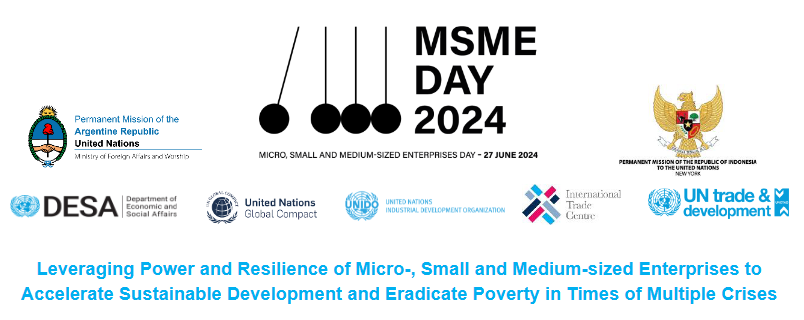MSME Day 2024: Leveraging Power and Resilience of Micro: Small and Medium-sized Enterprises to Accelerate Sustainable Development and Eradicate Poverty in Times of Multiple Crises
MSMEs are the backbone of many economies worldwide, they account for a significant share of employment and GDP, making their growth and sustainability crucial for overall economic health. These enterprises foster innovation, provide essential goods and services, and contribute to the socio-economic development of communities. In emerging markets, SMEs create 7 out of 10 jobs making them the highest generator of jobs in the formal sector. By 2030, 600 million jobs will be needed to absorb the growing global workforce, which makes SME development a high priority for many governments around the world. This is why, over the last several years, the Agripreneurship Alliance has been working hard to encourage and support young African food entrepreneurs launch and grow their food businesses. Through our ‘Entrepreneurship in Agribusiness’ course which has been facilitated by local partners across the continent, we are proud that we have trained over 1,200 young entrepreneurs in preparing a thorough business plan, that 275 Business Plans have been reviewed by a team of experts with individual feedback provided and that 180 businesses set up or strengthened to date, creating over 900 jobs.

Micro, Small and Medium-sized Enterprises (MSMEs) Day, celebrated on June 27th every year, emphasises the crucial role that these businesses play in economic development, job creation, and innovation. This year’s Micro, Small and Medium-sized Enterprises (MSMEs) Day theme “Leveraging Power and Resilience of Micro-, Small and Medium-sized Enterprises to Accelerate Sustainable Development and Eradicate Poverty in Times of Multiple Crises” highlights how these enterprises can leverage their inherent power and resilience to accelerate sustainable development and thrive in a changing global economy. The COVID-19 pandemic, geopolitical tensions, and climate change are among the multiple crises that have tested the resilience of MSMEs globally. Despite these challenges, MSMEs have demonstrated remarkable adaptability and perseverance. Their ability to pivot operations, embrace digital transformation, and innovate rapidly has been crucial in navigating these turbulent times. This theme encourages stakeholders, including governments, financial institutions, and larger corporations, to support MSMEs through policies, funding opportunities, and partnerships. It also underscores the need for MSMEs to adapt to new technologies, improve their business practices, and embrace inclusive and sustainable growth models.
Many MSMEs are at the forefront of green technology innovations. Companies developing solar-powered devices, biodegradable packaging, and sustainable agricultural practices are making significant contributions to environmental sustainability. MSMEs prioritise inclusive business models, such as fair trade practices and empowering local communities, helping to reduce inequalities and promote social cohesion, strengthening local supply chains which not only supports local economies but also enhances resilience against global disruptions by sourcing locally and promoting local craftsmanship which are vital in building robust local economies.
A report from World bank shows that access to finance is disproportionately difficult for smaller firms in the least developed countries (LDCs), with 41 percent of SMEs in LDCs reporting access to finance as a major constraint to their growth and development, by comparison to 30 percent in middle-income countries (MICs) and only 15 percent in high-income countries (HICs). Financial institutions and investors should develop innovative financing solutions tailored to the needs of these businesses. This includes microloans, venture capital, and crowdfunding platforms that can provide the necessary capital for growth and expansion. Most of the MSMEs have challenges of accessing global markets even when their products and services are needed widely,embracing digital tools and technologies can enhance the efficiency, reach, and competitiveness of MSMEs. Digital platforms will enable them to improve efficiency, reach new markets, and enhance customer engagement. The evolution and adoption of inclusive and sustainable business practices is not only beneficial for the environment and society but also enhances the resilience of MSMEs. Sustainable practices can open new market opportunities and improve brand reputation. This involves using eco-friendly materials, reducing waste through circular economy, and implementing energy-efficient processes.
Building the capacity of MSMEs through conferences, webinars, training and education is essential for their long-term success. Programs that focus on skills development, entrepreneurship, and management can empower business owners and employees to innovate and adapt to changing market conditions. Collaboration with educational institutions and industry experts can enhance these efforts.
To contribute to this cause, Agripreneurship Alliance conducted a webinar series on Climate Change and African Entrepreneur with support from ECOM Foundation for Development of Origin Resources in 2023 exploring the impact of climate change on the African Food system and how food entrepreneurs can become more sustainable by design, growing resilience, increasing adaptability and enabling mitigation. The keynote speakers shared their different perspectives and expertise on topics on climate change and entrepreneurship that is knowledge needed by our young African entrepreneurs to thrive. This webinar series is freely available on our YouTube channel here.

This year, the United Nation will hold the 2024 MSMEs Day Event in New York 27 June 2024 UNHQ, Conference Room 5 10:00 AM - 12:00 PM EDT. The session will explore ways that MSMEs, a sector that represents over 90 per cent of all businesses globally, can meaningfully contribute innovative solutions to the challenges of our time and drive forward inclusive growth and shared prosperity. Join in to watch the event on UN Web TV.
Through recognising and championing the efforts of these enterprises, by implementing supportive policies, reducing bureaucratic hurdles, providing tax incentives, simplified registration processes and access to affordable credit, we can harness the full potential of MSMEs acknowledging their contributions and supporting their growth and sustainability.
Sheila Mary Bahonya
Agripreneurship Alliance
2024